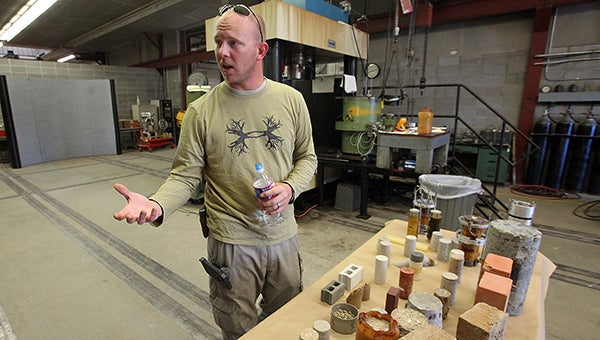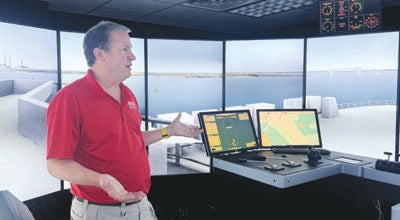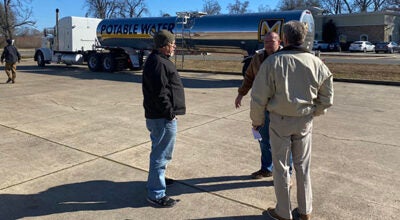ERDC employs vets, helps with readjustments
Published 10:23 am Friday, November 27, 2015

- EMPLOYED: U.S. Army veteran Joshua Brown works as an engineering tech in explosive effects at ERDC.
When Afghanistan veteran Allen Thornton moved to Mississippi in 2013, one of his priorities was to try and get a job with the U.S. Army Corps of Engineers.
In 2014, he got his wish and went to the work for the U.S. Army Engineering Research and Development Center in ERDC’s Geotechnical and Structures Laboratory, working as a liaison between that branch and ERDC’s logistics department.
Thornton was a beneficiary of the Corps’ Wounded Warrior Support program, which works to hire and place veterans with jobs in the various Corps branches and districts. ERDC’s Wounded Warrior Support Team has proven to be very adept at recruiting, hiring nine vets to work there in 2014. The team’s success was recognized by the Corps, which selected it for its first “Team of the Year” award.
“Unlike an award that you would get for technical research, this is an award that goes for supporting a group of individuals,” said Henry McDevitt, ERDC deputy to the commander and head of the ERDC Wounded Warrior program. “It means a lot to me, personally, and to the organization, because this organization is in tune to its people; it realizes the value of the people who work here, and the opportunity to help and support the nation on the military side and the civilian side.
“We are able to take a lot of people who have gained skills through the military and who can transition and work for us directly and come in and be effective from day one.”
McDevitt said many of the employees hired under the program are recruited from warrior transition units, which are located at several Army bases across the country. The closest transition unit to ERDC is Fort Polk, La.
“We do a lot of work and research for ERDC at Fort Polk,” he said, adding while on a recent visit to the base he visited the transition unit and talked with 120 people in the unit. Most of them, he said, were from Mississippi, Arkansas and Louisiana.
One of the attractions of the Corps of Engineers, he said, is its military background, which makes it easy for vets to come to work and feel comfortable.
“The opportunity to continue to drive military-type vehicles or work with technologies they’ve seen in the service, is real exciting to them, and the career opportunities are tremendous,” he said.
James Henry who is the program’s recruiting coordinator, said he receives resumes and candidates from several sources. One is the Army Wounded Warrior, or Group AW2 program liaison for Mississippi in Jackson.
“We get a lot just through word of mouth, and then as we contact them, they know others and send them our way,” he said. “I try to be the conduit and talk to them, and find out their backgrounds and link them up with something that matches their skill sets.”
He said the skills he sees cover a wide area, adding many of the candidates have college degrees in engineering, science areas and accounting. One Navy officer, he said, had a degree in oceanic science. He also received resumes and inquiries from people still in the National Guard or Army Reserve who are ending their enlistments.
Like many of the wounded warriors working at ERDC, Thorton contacted the AW2 advocate, who put him in touch with Henry.
“He called me in April to come to work,” he said.
One of Thornton’s deployments in the Army was at Turkey, where he worked in logistics for a space and missile defense brigade, handling supply and reports on inventory and personnel. At ERDC, “I work for the (GSL) division chief. I provide aid to property managers or agents. I make sure the paperwork is filled out. I love it.”
He said he wanted to work for ERDC “based on my experience in the Army. As I went through the ranks, I realized how much the Army Corps of Engineers meant to the soldiers on the ground.
“Just being a part of that was the most appealing part. I want to be able to say I work for the Corps of Engineers, and whether I invent the next thing that saves a life, I want to be part of that.”
Joshua Brown, and Iraq veteran working as an engineering technician in impacts and explosive effects at the GSL branch, said he learned about ERDC while in the transition unit at Fort Polk.
“I was an engineer and was a heavy equipment operator,” he said. “I retired in April and went to work in May 2015.”
Brown’s work involves preparing explosive charges to test the ability of structures and vehicles to withstand explosions and collect the test data.
“We use a lot of homemade explosives, whereas the Army is always, C-4,” he said. “(We use) the things accessible overseas that people can make explosives from. We deal with a lot of those things, and building a data base to determine the type of explosives used to damage something in an attack.”
He said his work “is pretty cool. I’ve been constantly learning since I’ve been here. Some of it is about relearning and learning where I fit in on the civilian side. The adjustment has been good.”
Brown said he had been in the Army since he was 17, “And when I was told I was going to be retired, I was actually worried because I had never really done a whole lot else. This job here, I was semi-used to. Being able to transfer a whole lot of skills over made the transition a whole lot easier.”
Albert Winchell, a Marine Corps veteran of Iraq and Afghanistan, works in ERDC’s public works program.
“Organizing is something I’m good at,” he said, adding he is working on a new computerized record system to reduce redundancy in work orders and prepare more transparency on work orders for ERDC labs.
He said the opportunity to work a ERDC was an offer he couldn’t refuse.
“It’s a good program. ERDC’s a very family-oriented place,” he said.
A master driver in the Army, Iraq veteran Jonathan Toth works in ERDC’s mobility systems branch, which tests military vehicles to build a database of terrains on which they can travel.
“We’ve got kind of a unique job, because no one in the government does what we do,” he said. “We do everything. We do most of our own maintenance.”
He said he was put in contact with Henry through the state’s AW2 advocate.
“I like working for the government. I liked the way the system worked, and I knew I could buy back my time and continue with my full retirement” he said. “I like working with the Corps. It’ better than working for the Army, because I don’t have to get up and do P.T. (physical training) in the morning.”






